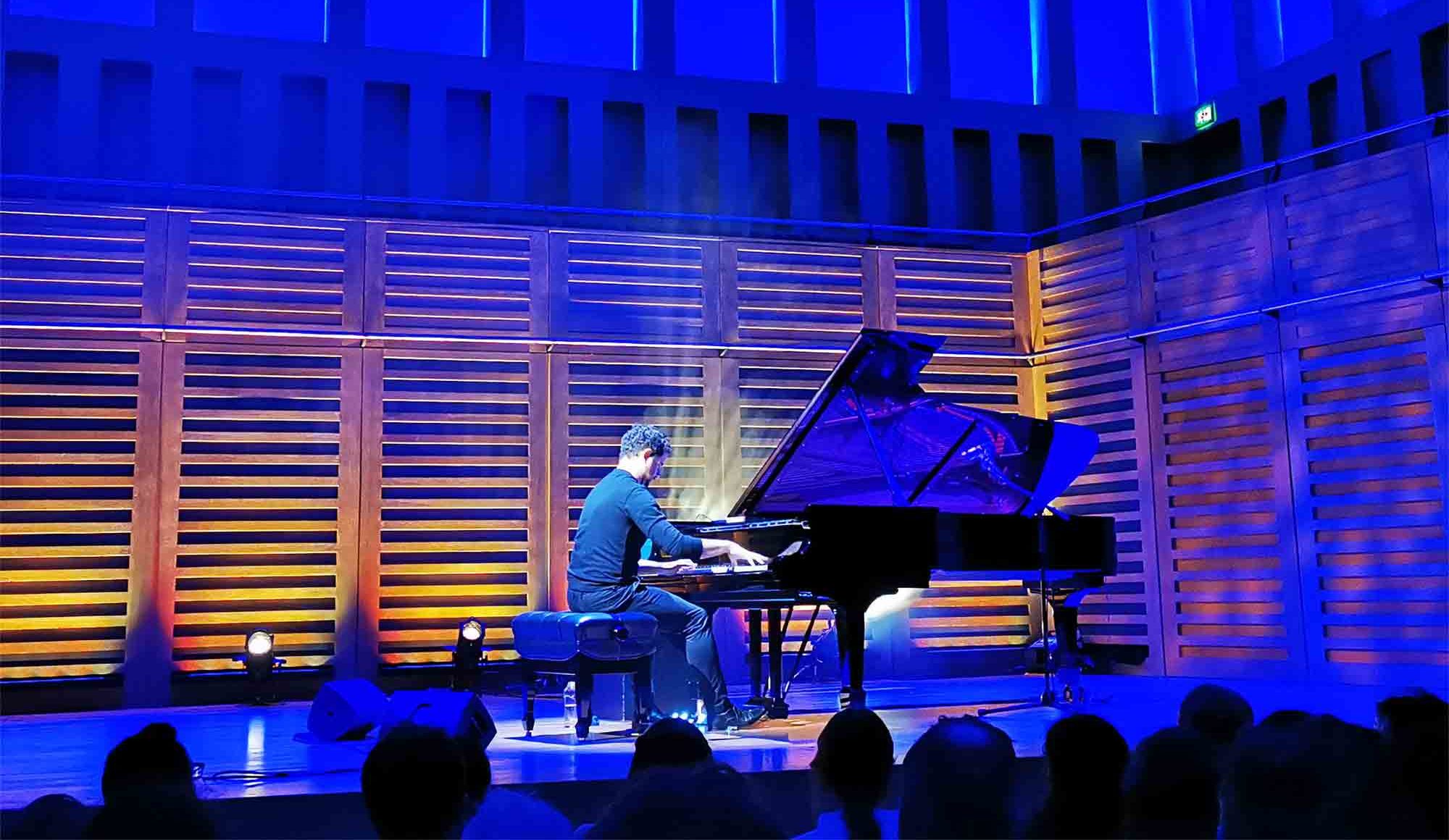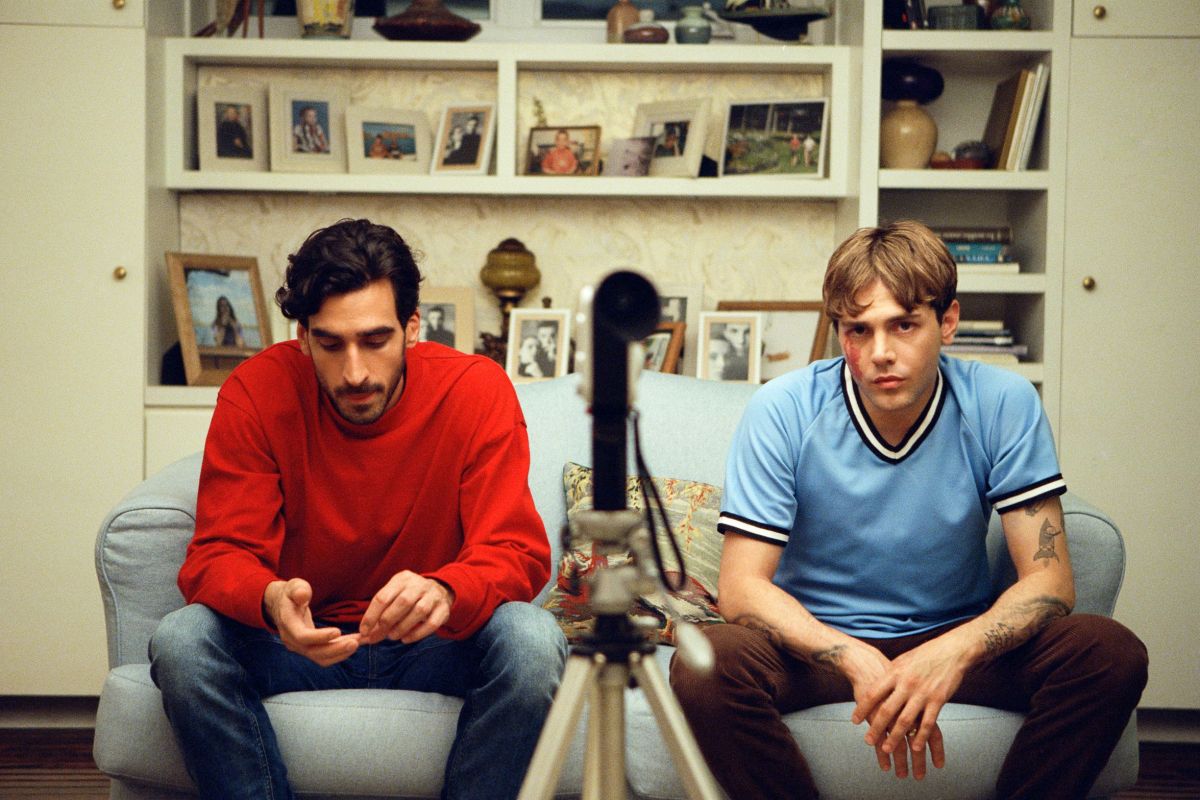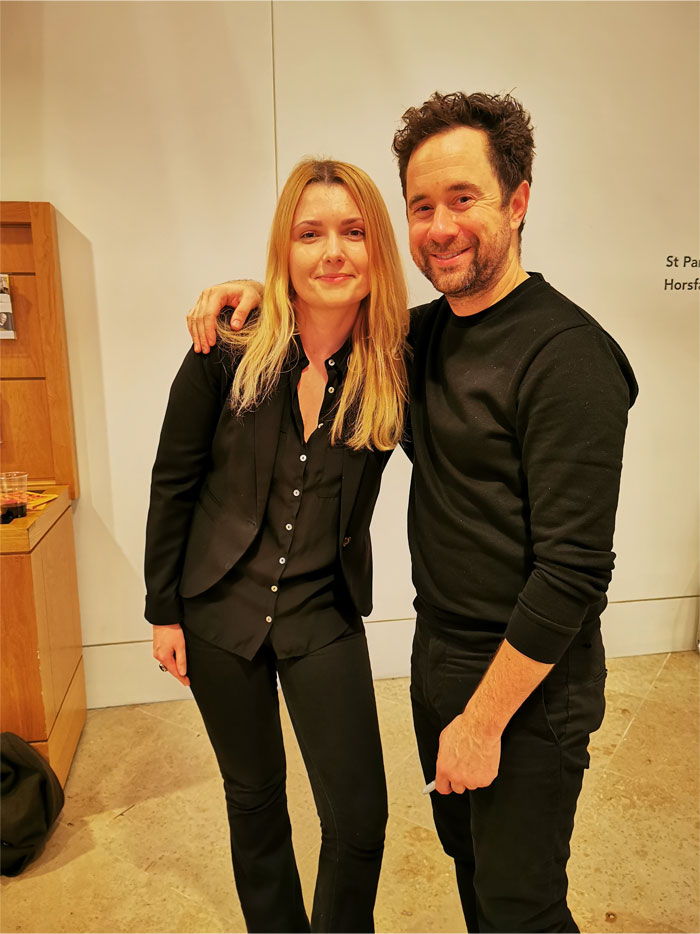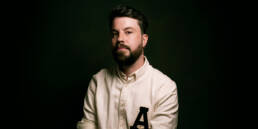
Jean-Michel Blais was on a European tour 8 November through 10 December and we had a chance to speak with him after his concert in Kings Place in London. We chatted with him about his musical journey thus far, his landmark album ‘Dans ma main’ and his first-ever feature film score written for Xavier Dolan’s ‘Matthias and Maxime’.
Stella: Jean-Michel! What a lovely concert. People seemed mesmerized by your music.
JMB: Thank you, Stella! You know, my performances are never the same. I try to improvise every time. So my pieces never sound the same.
Stella: That’s quite a jazz-like approach.
JMB: These days, people associate improvisation with jazz. It’s the only place – except if the composition asks for improvisation – where it’s OK to do improvisation these days. It was not the case before. There was a lot of improvising in the 17th and 18th centuries’ classical music. Sometimes people would just pitch to a small orchestra, like the bass note, then the chord and people would improvise notes on top of it as a group and it sounded good because people were educated better somehow for this and you know, actually I want to bring that back.
Stella: Hmm interesting.
JMB: Yeah, it’s exciting. I think we underestimate classical musicians. But then they absorb this world and they are like ‘Oh, I cannot play without a sheet of music’. ‘Oh, I can’t. I only interpret stuff. I don’t compose’. I’m sure you can! Because it’s creativity. It feels like society kills it somehow. I remember when I was a kid, everyone was drawing, you know? Everyone was somehow good. And then suddenly people stop. ‘I don’t draw. I’m not good’. Maybe if you stop you’re as good as where you stopped, probably, but what if you bring it back and develop your own style? But I think somehow society has advantages to having citizens that are not too creative.
Stella: Imagine if everyone was an artist running around.
JMB: [Laughs] Yeah, but I WISH! I know there’s a cliché with artists. I’m an artist, I’m a highly-organized person and I’m always on time. I know many artists that are not – the cliché artists – I don’t know if you define yourself as an artist or not, but there’s an important amount of creativity in your job. Like we’re in this hotel now and the woman who served us the breakfast this morning felt like she hates her job but maybe she could appreciate and be super-creative just in the way she approaches people and she’s nice to people. I think it can be everywhere, you know.
 JEAN-MICHEL PERFORMING AT KINGS PLACE, LONDON, NOVEMBER 2019
JEAN-MICHEL PERFORMING AT KINGS PLACE, LONDON, NOVEMBER 2019
Stella: Speaking of improvisation and the classical music form, I know that you were actually classically-trained and at some point, you felt in a way perhaps suffocated and decided to drop out of the conservatoire. And then you took a break for a while, after which you rediscovered your love for music.
JMB: Yes.
Stella: Do you remember the precise moment or the exact thing that made you rekindle your love with music?
JMB: I think it’s slightly more complicated than that. I think I’ve always been in love with music and that’s when I felt at the conservatory that it was not music anymore for me. That’s when I started to protect myself and closed. My very last attempts at the conservatory were these: I played a Gershwin piano concerto because I wanted to bring some jazz and improvisation and I composed a little cadenza, a clavier concerto like a Bach No 5.
And I understand that point of view: ‘you’re too young and you should focus on the piano, maybe later’. But I wanted NOW. And after a while of waiting, I just quit. But I’ve always been into music, even if I was not playing and composing on the piano. A good example would be that I left for Guatemala and then I ended up in the mountains with orphans and it happened that they were playing the marimba and I learned to play the marimba there.
Stella: Oh, nice!
JMB: I guess music always finds a way back to me. And when I travel usually I play less. I mean I compose less, even when I’m touring. But maybe that’s just because I don’t have the instrument. The classic [routine] is I wake up in the morning, take a coffee, I sit at the piano and I can play for about an hour or two and then my brain is fresh and I have ideas come through easily. I either do scales or I’ll play some Bach or sometimes I just improvise or work on a composition. It changes every day according to how I feel, I guess.
But I think if I had to choose one moment…It’s kind of a long story. When I was in Guatemala I was working with kids with disabilities in an orphanage. So at one point, I felt like I should do that at home because I know I understand my culture, I can help better than in another language, in another country. So when I came back I studied what we called ‘special education’, which is somehow palliating the system, the norm and trying to have people find their place in it. I was working with kids mainly and then I studied that for two years and I worked for like seven years in Montreal with kids with poor backgrounds that often came with social issues.
After a while, I felt that society was producing inequalities and if I wanted to really help and change something, it was probably not by fixing problems one by one, but maybe understanding more the society and placing myself in a more influential profession. It was a bit naïve, but there was also this wish to come out of it.
That’s when I quit this job, went to university, studied liberal arts and psychology. And I discovered a really nice hipster neighbourhood in Montreal called Mile End. There was a café there and in this café, there was a piano. It was a musical café and every hour there was a new musician. So I went there, took my courage, played the piano – they sort of liked it – and then I started playing weekly there. And that’s when I started to learn how to improvise in front of people. So this is the very first moment when I felt encouraged to improvise and to bring my own compositions at this café.
Stella: To be yourself.
JMB: Yes, to be myself musically. And this was tying back to the moment when I was told NOT to be myself at the conservatory – ten years prior. So there’s like a ten-year gap. And it’s too bad. I mean, not too bad, because I’ve learned so many human things in the meantime and maybe it made me more down-to-earth, connected and I’m interested in philosophy, politics, psychology. I’m not just like an artist who lives in his little musical world. And a lot of musicians over those ten years, because they need money, they will start working on projects they don’t believe in. They would do ads, syncs and stuff for the money, but there’s no soul. Their soul may be killed for the sake of making money to survive. And I totally understand that but I had the chance to take another path for those ten years.
At some point, I started to forget those compositions I wrote for my performances in the café because I was not recording them. And I asked a friend at university if he knew someone who could help me record my music. He offered to help. That friend is actually my producer now and one of my best friends. We have a very awesome collaboration. So this is for me the very first moment, when I recorded, because of the fear of losing my music. It’s all linked, it was always there, but I never realized it could be my job. What I knew is, every night I would go to bed after a concert I would think: ‘Why am I not doing that for a living every day? It makes me so happy’.
I guess that’s what life is about. Like a quest for being yourself. You’re always OK but then you discover a deeper level and you’re like ‘Whoa! This is so much more me and I’m so much more comfortable’. And you go there and it’s hard to come back.
Stella: Yeah… I’ve always had this mantra, perhaps it sounds naïve, but I do believe that everything happens for a reason. So your story feels like one of those. For a while, you were perhaps lost and didn’t know what to do, but then life finds its way and you discover your path.
JMB: Exactly! If I could make a list of all the synchronicities that happen…All the little moments that happen. Some of them make sense, but with some of them, there’s no way to control that. Things just happen and it’s about accepting them and following along.

Stella: Can you tell me a little bit about ‘Dans ma main’? What was the inspiration behind it? What is the album about? How did it make you feel when you wrote it?
JMB: First I want to say that your pronunciation was perfect. Congratulations!
Stella: Why thank you!
JMB: And the second thing is, it’s a long time since I’ve spoken about it. ‘Dans ma main’ comes from a French-Canadian Quebec poet, who is this very deep, obscure male poet who apparently died from a heart attack while canoeing, which sounds very Canadian and I’m sure it’s not the truth. This guy was having a horrible life because he felt he couldn’t live the life he wanted and that’s what I feel from his poems. ‘Dans ma main’ is a section from one of his poems, where he says something like ‘In my hand, the broken pieces of all the ways I could take’. This is the very first album I made by saying ‘OK, now this is my job, this is what I do, I write music’. And I was a bit worried. Because this was an album that I made in like one year, mixing Jarre, mixing electronics with classical.
To me, this idea of the hands is super complex. It’s this body part with so many tiny muscles and also, everyone has hands and everyone can do stuff with hands. It’s communist somehow, you know. And at the same time, it’s super individual because you may be taking notes right now and I’m hearing people working outside changing the door. So the hand is something people use for working. In my case, my job is to play the piano which is not higher or lower than changing a rooftop on a house.
So it was this idea of ‘OK, maybe I’m taking – in French we have this expression, ‘prendre en main’ – my destiny, I’m accepting it, I’m just taking all those broken pieces and I’m just trying to put together the puzzle and see what happens by taking the risk that the path might be music. So it was a big moment personally. That’s my profound meaning.
Stella: So it was a stepping stone moment for you.
JMB: Exactly. It was a big moment in my life. I was 32. I had a good job teaching special education, good advantages and all that. I knew that they would stop calling me at some point because I would be touring all the time or composing. I guess this was more of a life crisis moment.
Stella: I’d also like to chat with you a little bit about the score you created for Xavier Dolan’s film, ‘Matthias & Maxime’. Because this is your first scoring project for a feature film, how did you find the experience compared to writing music for your own albums?
JMB: It’s SO different. I loved it! I would resume it by [saying that] the music is at the service of something else. It’s not self-sufficient, so that’s a completely different position. If the music is too strong, which is often my case – my music is often very leading and has dramatic ways with strong melody – it doesn’t work. Because it doesn’t have to go over the image. And that’s why it was tricky to release it as music on its own without having something missing. That’s why all the versions are a bit different on the soundtrack.
 PHOTOGRAPH: SHAYNE LAVERDIERE
PHOTOGRAPH: SHAYNE LAVERDIERE
With Xavier, I’ve learned so much, via him, just because he knew how that works and I guess I was flexible enough to switch sometimes within a few seconds. For example, I love minor in music. And one of the first things he said was ‘I want MAJOR music’ and I’m like ‘Ooookay. It’s a big shift’.
What I loved was that we worked in a very unorthodox way. We would start composing themes before the film was even finished writing and filmed. And we met maybe seven times over almost a year and the music was just improvisation. What I didn’t know is he would use his wild filming and wild editing and when I saw the first version of the film there was music that was not ready to be final music, but in the end it was.
This is the way Xavier works anyway, even with his actors. The actors have scripts but still, they somehow improvise a bit and try to feel the moment. I attended when he was filming sometimes. I was there hiding in a little corner and that was one of the most beautiful moments of my life because before he started to shoot he pushed play and this was my music we improvised in the studio a few days before. And his actors were playing on it and the perfectionist in me was like ‘Oh my God! This is so wrong! This is so not what I wanted it to be and now everyone’s not going to like it and laugh at me’. [laughs] And in the end, it was beautiful to have something like this very natural and people just inspired by the music. Just a great moment.
So now I feel like I want to keep on doing it so much.
Stella: It definitely gave you a taste to want to continue to do it.
JMB: Oh yeah. I need to be excited by the project. If I have five interesting projects in a row, I’ll probably say ‘Yes’ to the five. And if nothing happens for five years, I’ll probably say ‘No’. It depends. But it was a great way to start. Xavier is one of our greatest film directors and is quite well-known within the non-commercial film world.
I’ve been so lucky. When I received a call from him I was like ‘Whoa! Is that happening?’ And up until Cannes…When I was in Cannes and they showed the film and it was my music, that’s when I realized it was true. Because before that I had the fear he’d think it’s not good and change the music. Just because I’m conscious that these things can happen. I even told him once. He was almost upset. I said: ‘If you feel at one point that it’s not what you need – piano music – I would not feel offended if you cut it. It’s your piece of art and I’m just supplementing it’. And he said: ‘Stop that! What are you saying? You’re giving the soul to the film and it’s important. If I chose you it’s because I want you’. Beautiful moment.
Stella: It sounds like Dolan gave not only you but the actors some freedom so he understands the need for the artists to express themselves without being very restricted.
JMB: Yeah. And it’s an incredible job. We underestimate the job of the film director. They also don’t all do it in the same way. He is a control freak. He will control the colour, how people dress, he often writes the script, he directs, he plays. He’s all over the place. In a good way. It’s very fun. He’s the happiest when he’s shooting. He’s a kid. So passionate! He’s a baby. He’s very serious. He doesn’t think he’s someone else, he’s very grounded in doing what he loves the most.
Stella: Directors famously ‘speak’ a different language when they try to explain to the composer what they want in terms of music. How did Dolan approach his request to you? Did he use any descriptive terms, such as colour or feelings? How did he explain what he wanted?
JMB: Very good question. Do you know who I have the biggest problem with so far? People in the ad agencies. They come with stuff like: ‘We want something explosive, but at the same time we want X and a climax’. It’s very interesting to translate. Xavier has a sensitivity that’s not from a ‘we need to sell perspective’. It’s very artistic.
First, he made me a list of all the music he planned to put in the film and all the music he thought I would be influenced by to compose mine, so that was very helpful at first. And to be honest, I listened to it once, no more, just because I didn’t want it to be…
Stella: To influence you too much.
JMB: Yeah yeah yeah! I just wanted to understand what he wanted. What was efficient and fun is that he was there every time a note was recorded. Rather than going through it in a rush towards the end, after the picture had been locked and you have like a month to come up with the music and your guy is in L.A. but you’re in Montreal…He was there. He was saying things like: ‘So now we need something a bit like talking with colours. And brightness and darkness. Now it’s a little bit close, it’s going to open. I hear something just improvising, just with the keys’.
And I was improvising and he was talking on top of it and explaining what he was seeing, doing a lot of gestures with his hand. He was often touching me. He couldn’t speak during the recording, as it would have been problematic so he was just pushing me [laughs]. If you listen carefully on the soundtrack, in ‘le lac’, you hear him right before climax whispering to me: ‘OK, now he’s crossing the lake and then the climax is coming’. So yeah, I guess we developed a little code. But I think the key is that we were together.
He’s very literate, but also very accessible. He can switch in the same sentence from a specific, complex word that a lot of people wouldn’t even know it exists or what it means and right after that have a very ‘street’ word that kids use. And this creates some waves of images. It’s like constant poetry the way he speaks about what he wants and makes it very clear. But it’s all about putting my ego aside and trying to do what he wants. Because he knows much better than I do.

Stella Lungu
Stella is the Editor-in-Chief of The Cinematic Journal. She is also the Managing Director of Wolkh, a PR, Marketing and Branding agency specializing in Film, TV, Interactive Entertainment and Performing Arts.
An Interview with Anna Drubich
Anna Drubich is a Russian-born composer of both concert and film music, and has studied across…
A Conversation with Adam Janota Bzowski
Adam Janota Bzowski is a London-based composer and sound designer who has been working in film and…
Interview: Rebekka Karijord on the Process of Scoring Songs of Earth
Songs of Earth is Margreth Olin’s critically acclaimed nature documentary which is both an intimate…
Don't miss out
Cinematic stories delivered straight to your inbox.
Ridiculously Effective PR & Marketing
Wolkh is a full-service creative agency specialising in PR, Marketing and Branding for Film, TV, Interactive Entertainment and Performing Arts.


